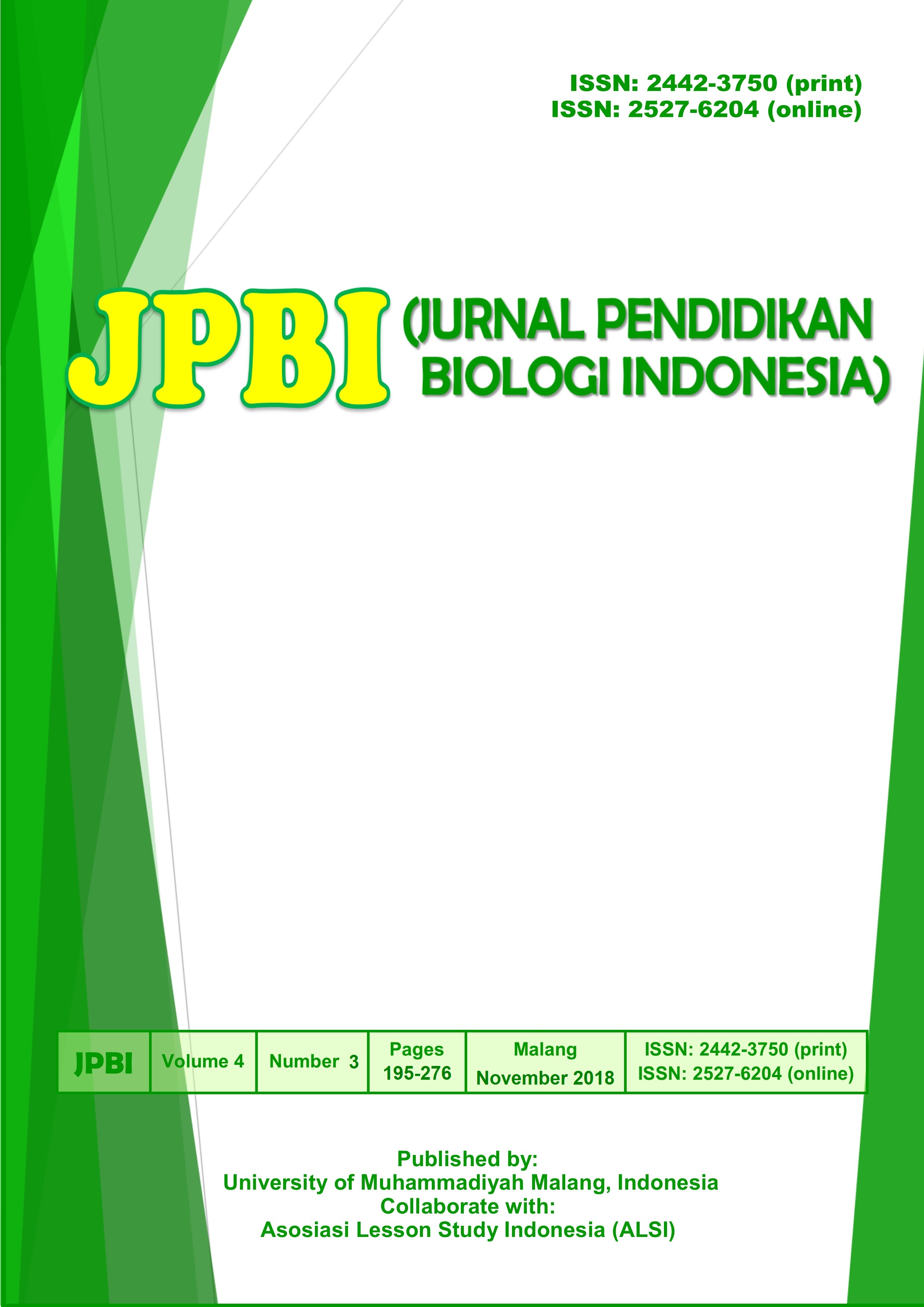SETS-based guided experiment book: Empowering science process skills of elementary school students
DOI:
https://doi.org/10.22219/jpbi.v4i3.6684Keywords:
Guided experiment book, SETS, science process skillAbstract
In this 21st–century, students are expected to have current competencies in which one of them is science process skills. The aim of this research was to empower science process skills through the SETS-based guided experiment book. This Posttest Only Control Group Design study involved 50 students of fifth grade which divided into two groups i.e. 25 students as the experimental group and 25 students as the control group. The activities were carried out for three months outside of school. The empowerment of science process skills was measured from the increasing scores before and after the implementation of the SETS Guided Experiment Book. The results showed that there was a significant different between experimental group and control group as the significancy value was 0.01 (sig. < 0.05). This means that the SETS-based guided experiment book can empower Science process skill of elementary school students.
Downloads
References
Bigbee, A., Curtiss, J., Litwin, L., & Harkin, M. (2010). Multiagency C2 experiment lifecycles: The collaborative experimentation environment as a case study. The International C2 Journal, 4(3), 1–24. Retrieved from https://www.mitre.org/sites/default/files/pdf/09_4330.pdf
Chiappetta, E. L., & Koballa, T. R. (2010). Thoughts and actions of beginning science teachers. In Science Instruction in the Middle and Secondary Schools: Developing Fundamental Knowledge and Skills (Seventh Ed, pp. 1–13). Houston: Pearson.
Dimopoulos, D. I., Paraskevopoulos, S., & Pantis, J. D. (2009). Planning educational activities and teaching strategies on constructing a conservation educational module. International Journal of Environmental and Science Education, 4(4), 351–364. Retrieved from https://files.eric.ed.gov/fulltext/EJ884402.pdf
Durmaz, H., & Mutlu, S. (2017). The effect of an instructional intervention on elementary students’ science process skills. Journal of Educational Research, 110(4), 433–445. https://doi.org/10.1080/00220671.2015.1118003
Ergul, R., Simsekli, Y., Calis, S., Ozdilek, Z., Gocmencelebi, S., & Sanli, M. (2011). The effects of inquiry-based science teaching on elementary school students’ science process skills and science attitudes. Bulgarian Journal of Science and Education Policy (BJSEP), Volume, 5(1), 49–68. Retrieved from http://see-articles.ceon.rs/data/pdf/1313-1958/2011/1313-19581101048E.pdf
Hobson, A. (2012). Teaching relevant science for scientific literacy. Journal of College Science Teaching, 30(4), 238–243. Retrieved from http://citeseerx.ist.psu.edu/viewdoc/download?doi=10.1.1.585.8867&rep=rep1&type=pdf
Holbrook, J., & Rannikmae, M. (2009). The meaning of scientific literacy. International Journal of Environmental & Science Education, 4(3), 275–288. Retrieved from https://files.eric.ed.gov/fulltext/EJ884397.pdf
Ismaili, M. (2000). The effectiveness of the task-based learning in developing students’ speaking skills in academic settings on the EFL classroom-A study conducted at South East European University (SEEU). In 1st Albania International Conference on Education (AICE) (pp. 291–299).
J. Brame, C., & Biel, R. (2015). Group work: Using cooperative learning groups effectively. Retrieved from http://cft.vanderbilt.edu/guides-sub-pages/setting-up-and-facilitating-group-work-using-cooperative-learning-groups-effectively/
O’Daniel, M., & Rosenstein, A. H. (2008). Professional communication and team collaboration. In R. G. Hughes (Ed.), Patient safety and quality: An evidence-based handbook for nurses. Retrieved from https://www.ncbi.nlm.nih.gov/books/NBK2637/
Özgelen, S. (2012). Students’ science process skills within a cognitive domain framework. Eurasia Journal of Mathematics, Science and Technology Education. https://doi.org/10.12973/eurasia.2012.846a
PISA (Programme for International Student Assessment). (2015). Pisa results in focus. Retrieved from https://www.oecd.org/pisa/pisa-2015-results-in-focus.pdf
Prasasti, P. A. T. (2017). Efektivitas scientific approach with guided experiment pada pembelajaran IPA untuk memberdayakan keterampilan proses sains siswa sekolah dasar. Profesi Pendidikan Dasar, 4(1), 19–26. Retrieved from journals.ums.ac.id/index.php/ppd/article/download/3623/3446
Yörük, N., Morgil, I., & Seçken, N. (2010). The effects of science, technology, society, environment (STSE) interactions on teaching chemistry. Natural Science, 02(12), 1417–1424. https://doi.org/10.4236/ns.2010.212173
Downloads
Published
Issue
Section
License
Authors who publish with JPBI (Jurnal Pendidikan Biologi Indonesia) agree to the following terms:
- For all articles published in JPBI, copyright is retained by the authors. Authors give permission to the publisher to announce the work with conditions. When the manuscript is accepted for publication, the authors agree to automatic transfer of the publishing right to the publisher.
- Authors retain copyright and grant the journal right of first publication with the work simultaneously licensed under a Creative Commons Attribution-ShareAlike 4.0 International License that allows others to share the work with an acknowledgment of the work's authorship and initial publication in this journal.
- Authors are able to enter into separate, additional contractual arrangements for the non-exclusive distribution of the journal's published version of the work (e.g., post it to an institutional repository or publish it in a book), with an acknowledgment of its initial publication in this journal.
- Authors are permitted and encouraged to post their work online (e.g., in institutional repositories or on their website) prior to and during the submission process, as it can lead to productive exchanges, as well as earlier and greater citation of published work (See The Effect of Open Access).

This work is licensed under a Creative Commons Attribution-ShareAlike 4.0 International License.


















